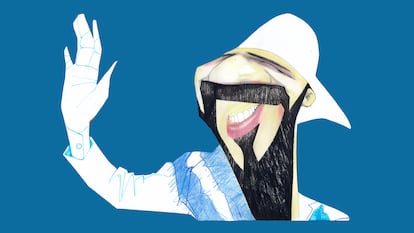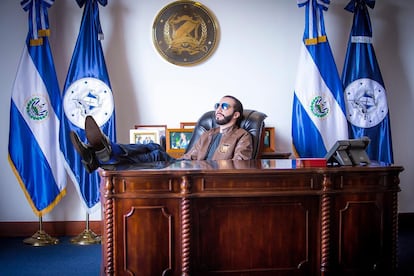Nayib Bukele’s origin story: a millennial’s ambition
The president of El Salvador began his political career as a small-town mayor, realizing his destiny for power.

There is a place called Nuevo Cuscatlán that embodies Nayib Bukele’s ambitions. It’s a small town about 15 minutes from San Salvador, the capital of El Salvador. In this mountainous and tropical setting, surrounded by coffee plantations, you’ll find humble shacks and mansions with swimming pools. This is where Bukele’s political career was born and later grew into a leader who has captivated the world and his nation of 6.3 million. Bukele became mayor here in 2012, and took office with a $2 million annual budget and very little experience. Before that, he had only managed a nightclub and a Yamaha dealership. Shortly after taking office, he began cruising through the streets in a pickup truck with tinted windows accompanied by bodyguards. He made impromptu speeches to the people of Nuevo Cuscatlán about paradigms and abstract concepts with the confidence of someone born into privilege. His audience was often left speechless, captivated as they watched the young mayor.

Those who know him say his arrogance is only matched by his ambition. Back then, Bukele believed his destiny was to be the next president, not just a small-town mayor. Despite belonging to the FMLN, El Salvador’s main left-wing party since the civil war ended in 1992, he often denounced it as outdated and incompetent. His millennial self-assurance made his FMLN colleagues uncomfortable. “He was a wolf and we were the sheep. But we didn’t realize it back then,” said a person who was present at those FMLN meetings. Bukele later ran for mayor of San Salvador and won, but it was also too confining for the driven politician. When the FMLN balked at nominating Bukele as its presidential candidate in 2019 citing his youth, the 37-year-old mayor lost his patience and launched a campaign to discredit the party. The FMLN promptly kicked him out. Absolute power now seemed within reach.
Walking around Nuevo Cuscatlán today, it’s hard not to think that it was all part of a master plan. The letter ‘N’ is emblazoned all over town, representing both its name and Bukele’s. Buildings, sidewalks and curbs are painted cyan, the greenish-blue color of Bukele’s Nuevas Ideas (New Ideas, in English) party. The embryo was here, although many chose to ignore it. The cult of personality, the omnipresence, the command and control. Luis Ponce, a 47-year-old municipal worker with metal-capped teeth, shows the same fascination with Bukele that captivates the entire country. He recounts how Bukele came to his wedding and served as master of ceremonies. Bukele brought order to this place, painting the houses in cheerful colors and attending the modest parties of ordinary people. When Bukele moved on to bigger and better things, the locals cried. Ponce doesn’t care that his son was imprisoned during Bukele’s extended state of emergency. He believes his son is better off “inside” because he was involved in illegal activities. He thinks that Bukele, who enjoys an approval rating of almost 90% in El Salvador, has divine help. “This president has God’s power within him. This man is a quality person.”
Bukele will almost certainly be reelected as president on February 4 with an overwhelming majority. The Salvadoran Constitution prohibits consecutive presidential terms, but some sleight of hand by a Constitutional Court handpicked by Bukele allowed him to run on a technicality. Polls suggest he may win over 80% of the vote. His iron-fisted leadership style has crushed almost all opposition since he won the presidency five years ago. Responding to rampant gang violence, Bukele declared a state of emergency in March 2002 that remains in effect. He targeted the two main gangs, Mara Salvatrucha (MS-13) and Barrio 18, ignoring protests by human rights organizations denouncing the thousands of people arrested and jailed without trial or due process. Lawyers have very limited access to their clients, who are held in a mega-prison called the Terrorism Confinement Center. Families are left to wonder about their loved ones in prison, who are not allowed to make any calls.
The country’s economy isn’t doing well. Local newspapers report people going hungry and eating meager meals. However, breaking the gangs’ grip on everyday life has made Bukele immensely popular, and Salvadorans ignore the international outcry about authoritarianism. Bukele is all-powerful and omnipresent in El Salvador. The airport terminal has a replica of the presidential office with portraits of Bukele and First Lady Gabriela Rodríguez where travelers happily take selfies. Roads are lined with billboards promoting the president and his party’s candidates for Congress. There is no sign of FMLN or Arena, the right-wing party. Images of Bukele with his neatly groomed beard, slicked-back hair and tough-guy look are everywhere.
The Bukele magic didn’t work on Bertha Deleón, who led his legal team for four years. She’s not sure if it’s because of his age (Deleon is three years older than Bukele), but she always saw him as an immature and impulsive man, addicted to his phone and social media. He couldn’t go 30 minutes without checking Twitter to see what people were saying about him. “He was always very scattered. It’s hard for him to focus and get organized,” she said. “But I think he’s really skilled at sticking to the script he’s given, and that’s what he communicates very well. He totally captivated the younger generation.” Deleón defended Bukele in three legal proceedings before he became president in 2019. Bukele relies heavily on his brother Karim for support. Karim is his closest advisor and campaign manager, providing calm analysis and decision-making guidance.
Nayib is the fifth child of Armando Bukele, an influential entrepreneur of Palestinian origin who founded the first mosque in El Salvador. Don Armando, as everyone called him, is the biggest role model for his son. Nayib has gone so far as to inflate his father’s accomplishments, saying he had a higher IQ than Einstein and even suggesting he was nominated for a Nobel Prize. The Bukele patriarch also fathered Karim, Ibrajim Antonio and Yusef Alí with Olga Marina Ortez, siblings who are all part of the president’s tight inner circle. Other long-time Bukele confidantes include classmates from the Panamerican School in San Salvador and President of Congress Ernesto Castro.

Bukele hasn’t strayed far from his roots. He still lives in Los Sueños, an exclusive neighborhood on a hill overlooking Nuevo Cuscatlán that is now guarded by the army. He has turned a town that everyone used to confuse with its neighbor, Antiguo Cuscatlán, into a magnet for YouTubers and influencers, and a coveted location for other wealthy homeowners who want to live near the president. Bukele’s neighbors know when he comes and goes because the streets are closed off as his convoy roars past. But the president has not held a single campaign event in the three months. Bukele always claimed that he could govern the country from a mobile phone. It’s great for his image that his millions of followers see him still living in Los Sueños.
Sign up for our weekly newsletter to get more English-language news coverage from EL PAÍS USA Edition
Tu suscripción se está usando en otro dispositivo
¿Quieres añadir otro usuario a tu suscripción?
Si continúas leyendo en este dispositivo, no se podrá leer en el otro.
FlechaTu suscripción se está usando en otro dispositivo y solo puedes acceder a EL PAÍS desde un dispositivo a la vez.
Si quieres compartir tu cuenta, cambia tu suscripción a la modalidad Premium, así podrás añadir otro usuario. Cada uno accederá con su propia cuenta de email, lo que os permitirá personalizar vuestra experiencia en EL PAÍS.
¿Tienes una suscripción de empresa? Accede aquí para contratar más cuentas.
En el caso de no saber quién está usando tu cuenta, te recomendamos cambiar tu contraseña aquí.
Si decides continuar compartiendo tu cuenta, este mensaje se mostrará en tu dispositivo y en el de la otra persona que está usando tu cuenta de forma indefinida, afectando a tu experiencia de lectura. Puedes consultar aquí los términos y condiciones de la suscripción digital.








































